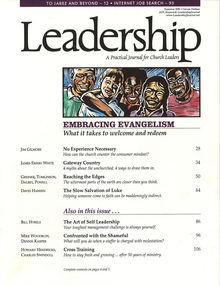Remember Oskar Schindler’s last emotional words to his Jewish workers? At a time when he might have basked in his heroic accomplishments, he cried, “I could have done more!” Meaning that he could have “purchased” more Jews from the gas chamber had he sacrificed his fancy car, expensive suits, and glitzy jewelry.
This is not far from the feeling many of us have whenever we think about evangelism. As biblical people we affirm the “lost” state of humanity, the necessity of salvation, and the promise of abundant and eternal life to all who believe. We’re obligated, by call, to proclaim these truths. But we are rarely satisfied with how much we’ve done. We identify with Schindler’s wrenching cry. In a world so large, so spiritually empty, we all could do more.
As a pastor I constantly struggled against an institutional system that relentlessly sucked me into its center. It was easy to go an entire week without one substantial conversation with someone outside the faith. Then too, I know the fears associated with inviting a person to follow Jesus Christ. What if he says no and rejects you, too! Often I have fought the temptation to downsize my allegiance to evangelism by rationalizing away the necessity for a person to meet the Savior.
Occasionally I have consoled myself by arguing that I was not gifted in evangelism. Yet the memory of one man lingers with me. Pointing to a place at the front of the sanctuary he said to me, “Six years ago this week, you pointed me to Christ on that very spot.” Gifted or not, our telling matters.
Three things have helped me come to terms with evangelism.
1. I have been called to challenge all (repeat all) people to constant movement in their journey to God. Four markers in that journey stand out. From spectator (the religiously interested) to seeker (who have advanced to serious curiosity) to follower (who advance to an intentional trust in Christ as Savior and Lord) to kingdom-builder (who embrace the mission of Jesus and commit themselves to service-driven lives). My task: to encourage all who will listen to move along that path. My favorite question: What stops you from taking one more step?
2. While some have seen thousands come to faith (and how I admire them!), I have chosen to be content with one person at a time. I am touched by the oft-told story of an older man throwing beached starfish back into the ocean before they die in the high sun. A young cynic notes the thousands of starfish left on the beach and says, “What difference can you hope to make by throwing back just a few?”
As the old guy picks up another starfish and throws it into the water, he mutters, “Not sure. But I certainly made a difference for that one.”
His perspective delights me.
3. Ours is leveraged influence. The real effect of evangelism must be measured two or three generations out. A man whose name most of us do not know influenced D.L. Moody to faith in Christ. A generation later, there were thousands and thousands of new believers. Someone (I don’t know who) influenced Henrietta Mears, and she influenced Bill Bright and, poof, Campus Crusade appeared. Tom Phillips, Harold Hughes, and Doug Coe met Chuck Colson in his worst moments, and—as someone says—now you know the rest of the story.
Your list of converts may be small, but in God’s hands, your witness is leveraged exponentially to history-altering proportions.
So I know how Oskar Schindler felt. I should have liked to tell Oskar Schindler the Bible story of the boy with the five loaves and two fishes. Not much in that sack; could have been more. But in the hands of Jesus, oh, what a difference! In evangelism, that’s what keeps me going.
Gordon MacDonald is editor-at-large of Leadership.
Copyright © 2001 by the author or Christianity Today/Leadership journal. Click here for reprint information on Leadership.









